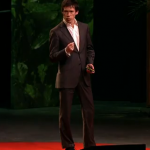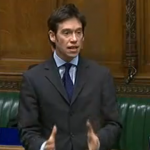If you had climbed the pale soaking fell-grass out of Bewcastle, and passed the Bloody Bush, you would have seen Tynedale: close-cropped pasture behind dry-stone walls, owner-occupied farms, Milburns and Dodds, and the bastle-houses of bandits, converted to barns. But now the shape of the valley can only be guessed at. A rough carpet of black-green needles, trembling forty feet above the ground, conceals the land. Alaskan pine tops, climbing up to Peel Fell, engulf the stone markers, lean down towards Carter Bar and Redesdale, and colonise 200,000 hectares of moor, mire and upland farm. And at its centre, with houses drowned beneath the waves, lies a vast artificial reservoir, built too late for an industry that no longer exists. This is Kershope and Kielder. There are delicately-laid mountain bike trails, and in clearings you can hear the great glass-cabined harvester machines, ripping and slicing trees. But I have walked for a whole day, clambering around fallen trunks in the fire breaks, stumbling over the bare ridges and furrows, without seeing a human and hardly a bird.
Almost all of us, instinctively, want to protect woodland. But when we think of forests we tend to think of native trees – the ash of Cumbria, the coppiced hazel and thick-girthed sessile oak under the cliffs and caves of the Eden between Armathwaite and Wetheral. We are interested in the ancient woodland of the Fairy Tables along the Black Lyme, because its soil – undisturbed for hundreds of years – preserves unusual lichen and insects. But the creation of Kielder involved draining thousands of acres of rare upland mosses, ploughing and close planting ancient grasslands, and replacing it all with miles of American sitka monoculture. But hundreds of thousands protested against the government selling off public forest estate, such as Kielder; the independent panel on forestry has just agreed with the protest; and I support their call. Why?
The answer is that in forestry – as in farming – commercial production is vital to sustaining things far beyond sitka monoculture. Timber processing brings 600 million pounds a year to Penrith and the Border, and provides employment (through BSW, Jenkinson’s and others) for 2,500 people – more than a third of the total number of forestry and wood-processing jobs in England. And it is a good industry. We are learning again that wood is one of the most impressive, renewable products for building houses: it can be felled, replaced and recycled in a way that is inconceivable for aluminium. Wigton’s Innovia is showing how wood cellophane can be spun into the most extraordinary films, for packing and labelling: entirely renewable and biodegradable, and in a manner that is impossible for plastics.
Meanwhile, such business preserves a whole tradition focused on public access, and diverse species. Employment in the commercial sector continues to draw thousands to develop their skills as foresters, and study at places such as our National School of Forestry at Newton Rigg. And this education and skills-base underlies the thousands more who go on to work as professionals or volunteers in ancient forests. The environmental programmes – from planting native broadleaves around the spruce, to regenerating the moorland – are often run by commercial estates. And at Kielder you can see the Forestry Commission putting more and more energy into bringing visitors into the estate: developing the reservoir as a beauty spot, creating a beautiful bridge for a marathon track, or opening an astronomical observatory for the public.
This is a lesson for farming too. There – as in forestry – commercial production matters. In both cases, it provides the incomes and maintains the enterprises, which both people and sustain the landscape. (And too single-minded an attitude towards re-wilding or creating natural landscapes can be counter-productive – as when reducing stocking rates too far makes hill grazing untenable and farms inactive). In both cases, Government has a role. Trees take forty years or more to grow, and grassland evolves slowly. These are not simple commercial propositions – small changes in commodity prices can produce very damaging long-term results for our industry, our products, and our landscape. Hence, I was pleased that the Government dropped its proposal to sell-off the forest estate.
But let me end with a note of caution. The Independent Panel Report wants to increase by fifty per cent the amount of woodland in Britain. Others want to double the tree-cover in the Lake District, expanding it from ten to twenty per cent of the landmass. We have not been a country of limitless Hansel & Gretel forests at any time in recorded history. (We now know that Northern Cumbria had been felled and planted before Hadrian’s Wall was laid). And, despite all the benefits of forestry, we should not aim to become one now. Our forests are a unique and wonderful heritage, but they should exist alongside, not instead of, other landscapes we love: open moorland, smooth slopes, and upland sheep farms. The interest of the British countryside lies in its balance between valleys, cliffs, woods, fells and pasture. Kielder is a prodigy, Ennerdale is a delight, but we should not set a target which would drown Ullswater or Wastwater under trees.











